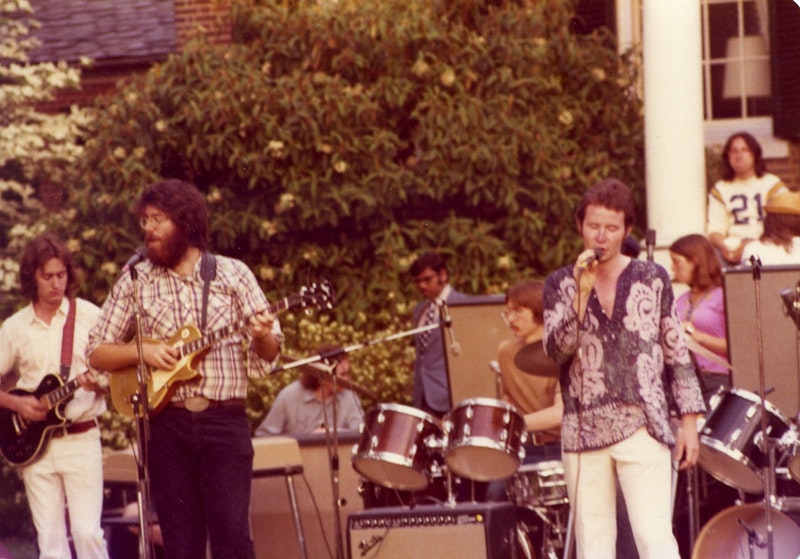One night in the summer of 1977 my friend Craig Hankin and I wandered around the boardwalk of Ocean City, MD, settled into a mostly-deserted arcade, played some pinball, drank bottled National Premium and got sucked into the video game Pong, which neither of us had ever encountered before. It was prehistoric by the standards of even a decade later, but was so compelling—we dubbed it “The Button”—that quarter after quarter was pumped into the coin slot. What finally rescued us from this entirely unexpected narcotic trance was a song played loudly either on the jukebox or sound system: The Sanford-Townsend Band’s hit single “Smoke from a Distant Fire.” Craig and I looked at each other, admiring the “blue-eyed soul” of “Smoke,” and instantaneously said, “This was supposed to be Ocean Rose.”
At any college campus, dating back to the 60s, there are popular “house” bands that perform a lot, whether outside on a temperate day or at frat parties, and while they have a fleeting fan base (and a number of groupies), most of them rely on covers and eventually call it a day. It’s a fun way for the bands to make some money and achieve a degree of campus notoriety. There were a bunch of similar groups at Johns Hopkins University in the mid-1970s, but Ocean Rose stood out as an extraordinarily talented outfit that legitimately had that 10 percent shot of getting noticed by some record company scout and hitting it big. I first saw the band play outside on the Hopkins upper quad as a freshman in the fall of ’73 and was knocked out; in the next couple of years an Ocean Rose concert was an event, and it’s only a slight exaggeration to say that crowds danced deliriously, shouting out requests for favorite songs. (I was guiltier than most, calling for my favorite OR original, “Buccaneer,” at every show, a likely annoyance that was good-naturedly absorbed by the band.)
The lead singer was a charismatic Bostonian named Jimmy Owens, and if he didn’t quite possess the pipes of a 17-year-old Stevie Winwood, he wasn’t far off. Guitarists Kurt Hammond and Milton Reder were the embodiment of stoic cool (and shared songwriting duties with Owens), and the band was rounded out by Bruce Katz, Steve Jones, Bruce Landolt and Chuck Swartley.
Like a lot of groups, Ocean Rose was heavy on covers at first, but their taste was impeccable: “Fresh Garbage” and “I Got a Line on You,” from Spirit; the Stones’ forgotten but brilliant “Connection”; Dylan’s “It Takes a Lot to Laugh, It Takes a Train to Cry”; and Steely Dan’s “My Old School,” among others. (Thanks to Craig, probably the closest person to the band, for jogging my memory last night.) I was in no way a Grateful Dead fan—at least after Jerry Garcia went the soft, singer-songwriter route—but Ocean Rose played rousing renditions of “My Uncle” and “Playing in the Band.” Original songs, which grew more sophisticated and uncommonly literate every other month, included “Smiles Lightning,” “Television Joy,” “Girl in the Red Bandana” (women went nuts over that one), “Do the Tool,” “Hearts Behind Clouds,” “Darlin’ Chauffeur,” “Rogues Gallery” and “Wrestling With the Thieves.”
As it happened, in my sophomore year, I lived in a rowhouse on E. 33rd St. with four other guys—Owens, Billy McKey, Dave Adam and George Davis—and as I was the last one in, got the basement for my $32/per month rent. Mattress on the cement floor, a suitcase for my clothes, and I was set, and it didn’t matter one whit that Ocean Rose used the basement to practice, sometimes when I called it a night. Slept right through it. A man of his times, Jimmy was heavy into organic food, natural peanut butter, honey, nuts, etc. that he picked up at the food co-op Sam’s Belly just a few minutes away off Greenmount Ave. We’d often go to a quasi-restaurant called Stone Soup—what else?—for pancakes on Sunday mornings, and as I recall it was a “pay what you can, man” sort of place, the equivalent of which probably numbered hundreds, if not thousands, in 1975.
As you might’ve guessed, Ocean Rose never did get a record deal, never went to the toppermost of the poppermost. Milt Reder went on to medical school as planned, and a successful practice, and the bandmates scattered in the next couple of years. A keen disappointment for the fans of Ocean Rose, but you roll on. Nevertheless, all these years later—and after seeing big acts in their prime like Van Morrison, the Byrds, the Stones, pre-Born to Run Springsteen, Randy Newman, Talking Heads, Roxy Music, Bowie, Elvis Costello, The Smiths and so on—I don’t think I ever experienced the pure, Wordsworthian joy of seeing Ocean Rose play live.
—Follow Russ Smith on Twitter: @MUGGER1955

